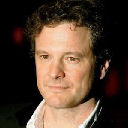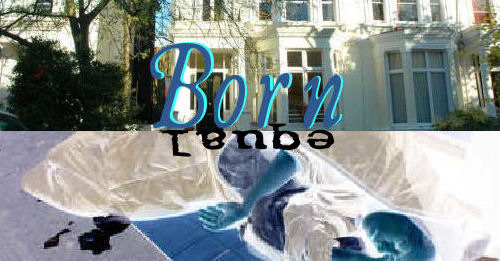

Social inequality in Britain today is addressed through the lives of several characters whose paths collide at a B&B temporarily housing the homeless and dispossessed. Mark (Colin Firth) is a wealthy city worker whose conscience and guilt about his luxurious lifestyle prompt him to try to help those less fortunate, but it results in turmoil for both himself and others. Staying at the B&B are Michelle (Anne-Marie Duff), a pregnant mother with a young child who has escaped an abusive husband; Nigerian Yemi (David Oyelowo), and his family; and Robert (Robert Carlyle), newly released from prison and embarking on a search for his mother.

 |
 |
 |
||
| On
location (updated 12/09/06) |
Promo screencaps (updated 12/04/06) |
Production
stills (updated 12/09/06) |

(Independent, Dec 14, 2006, by James Rampton)
Born Equal, a potent, yet bleak new BBC1 drama about the plight of the homeless, was originally to be titled To Have and Have Not. That sums up the divide that is at the heart of Dominic Savage's film. Boasting an unusually stellar cast for television—movie stars Colin Firth and Robert Carlyle rub shoulders with Emilia Fox, Anne-Marie Duff, David Oyelowo and Julia Davis—Born Equal explores the gulf between rich and poor. Savage's drama homes in on Swiss Cottage. Although the haves and have-nots live next-door to each other in that affluent area of north London, there remains a seemingly unbridgeable gap between them.
In the film, Mark (Firth) is a hedge fund manager who is toasting a million-pound bonus. On the way back from his celebrations, an acrimonious encounter with an aggressive beggar in a subway causes Mark to reassess his life. Assailed by guilt, he begins to realise the emptiness of his all-consuming pursuit of money and wants to put something back into society. So he volunteers to help out at a local homeless hostel.
There, he strikes up an ambiguous relationship with a young teenage runaway, Zoë (Nichola Burley), and he pours his heart out to her: "I looked around at everything I had, and it just seemed emptier and emptier." Troubled by his feelings for Zoë, Mark refuses to tell his heavily pregnant wife Laura (Fox) what he's doing in the evenings and she starts to suspect him of having an affair. Meanwhile, in the same hostel, a tentative romance develops between Robert (Carlyle), a brutalised ex-con, and Michelle (Duff), a young mother fleeing her abusive husband. But the impoverished Robert is becoming increasingly incensed by the ostentatious exhibitions of wealth just around the corner from their hostel. He snarls to Michelle, "I don't like it when people display it, when it's pushed down your throat. That's when it gets annoying." Trying her best to calm her volatile new partner, Michelle ventures: "We're all under the same sky, aren't we?"
Savage, who won Baftas for both When I Was 12 and Nice Girl, has been slaving over a hot editing desk in Soho. Pausing in his labours, he explains that during many months of research and interviews with more than 50 homeless people, he was struck by the strong sense of "us and them" that stalks so many streets of London.
"The issue I really wanted to deal with was the extremes of difference in people's lives," reflects Savage. "In a place like London, those extremes can be experienced within just a few streets. People can be in hugely different worlds but sharing the same space. The film shows huge contrasts between people and how they live, their ideas, what they've got and what they haven't got."
The most remarkable aspect of Born Equal is that it is entirely improvised. Like real-life speech, the dialogue is jagged and jerky, and sentences tail off without warning. This gives the drama an unvarnished and naturalistic quality. The actors never knew in advance in which direction a scene might take them. The director even shot two alternative endings, and only decided which one to use when making the final cut.
Savage, a genial, bald man who is far more cheery than his films, is a former actor who evidently knows how to bring the best out of his cast. Yet he still admits that the process of improvisation "is scary. Even after five films like this [as well as his Bafta-winning work, Savage directed the acclaimed Out of Control and Love + Hate], I still get totally nervous before each one. But my attitude has always been that this approach concentrates the mind. It's good to feel that this could be your last ever film.
"No one else works like this—Mike Leigh locks down his dialogue after months of improv. It's a huge risk—the actors could be totally embarrassing. That's why casting is so important; it's a long and rigorous process. You might find certain stars who are very closed, and you know that with them it could be a hard journey to something that in the end may not work anyway.
"But once you've found the right actors—ones you know will be in tune with the subject matter—they feel liberated and empowered by the experience. Often you feel manipulated if you stick to a script and can't develop themes. You can feel hemmed in on a conventional film. The restrictions on your emotions put a huge burden on you. This, on the other hand, gives the actors the freedom to fly."
What was the experience like for the actors themselves, though? "Absolutely terrifying," exclaims Firth. "Dominic doesn't even rehearse. He just switches on the camera and says: 'Go for it.' It's like jumping into a freezing pool - you just hope you pop up again alive." The actor continues: "I found it particularly challenging because the character of Mark was so far removed from me. I don't react to my wife or the homeless in that way, and I'm certainly not a hedge fund manager.
"In fact, I wouldn't understand what a hedge fund manager does even if you sat me down and explained it to me for an entire lifetime. Anything financial gets actors into a complete terror. I start to suffocate when I see numbers on a screen. It takes me right back to that utter inability to get anywhere with maths O-level."
For her part, Fox found the improvisation exhilarating. "The whole process makes the drama much more alive. People often watch filming and say: 'It's so boring. The actors just say the same lines over and over again.' There is no danger of that happening on a Dominic Savage film. Every take has a real spontaneity about it - and that is reflected in the vividness of the finished drama."
Sometimes the plausibility of it all got to her. The actress recollects that "in one sequence my character doesn't know where her husband is. She has been awake for hours waiting for him to come home. Playing the scene where Mark finally comes home and Laura confronts him felt very real. I absolutely got into character. So as Laura, I had this awful hollow sickness in my stomach because I thought that my worst fears were confirmed, that he was having an affair and that my life would be changed forever.
"I got myself into a real state, to the point where I had no control. That's what Dominic gets out of his actors—that pure emotion. And that, I hope, is what makes his drama so credible."
Despite such traumas, Fox clearly relished the process. "It's such a delight to work like that," she enthuses. "I feel like I've just test-driven a great car. Now I've got a feel for it, I just want another drive. Perhaps I could improvise something during my lunchbreaks on Silent Witness [Fox has a starring role]."
When Born Equal was announced earlier this year, it was slated to be part of the 40th-anniversary celebrations of Cathy Come Home, Ken Loach's pioneering television drama about homelessness. That film is a rare example of TV having a tangible impact on society; the uproar it caused led to the formation of the charity for the homeless, Shelter.
Savage shies away from comparisons between his film and Loach's. "It's not fair to attach Born Equal to the most groundbreaking landmark television drama of all time. I don't want to repeat what Ken Loach said. And I don't want to make an overly polemical film, either. Once you start tying to make overt political points, that's a turn-off. I made this less out of anger, and more out of sympathy."
All the same, do the people involved in Born Equal believe that a film such as theirs can help to change society? "For years now, I've been distressed about our attitude towards the homeless and asylum-seekers," says Firth. "It troubles me greatly because it's so irrational, so deeply misguided and so cruel. So, as a portrait of what some people are up against, Born Equal is really positive. It won't change viewers' opinions overnight, but it manages to humanise the sort of people we might otherwise cross the road to avoid. Next time someone looks at a homeless person with fear and loathing, they might remember a character they liked from this drama. The best films hang around in people's minds for years. You hear people saying: 'That's like a moment in The Godfather or Casablanca.' I'd love this film to seep into people's consciousness in the same way."
Powerful as it is, Born Equal is scarcely uplifting. Light years away from traditional, heartwarming Sunday-night fare, it will not be bringing Christmas cheer to the nation's living rooms. But Savage makes no apology for the challenging nature of his film. "The previewers might say: 'This is dark, gritty, difficult', but people shouldn't be scared of those areas. That's where the most interesting drama lies. It does not reside in 'And they all lived happily ever after'."
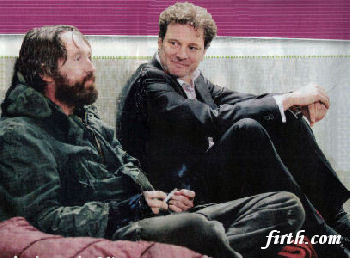 Colin comes home
Colin comes home(TV Guide, Dec 16, 2006, by Wendy Granditer)
When fictional drama Cathy Come Home was first shown on British TV in 1966, it was such a realistic look at the issue of homelessness that many viewers mistook it for a documentary. Forty years on, a new one-off drama about social exclusion, Born Equal, hits our screens.
And while it’s unlikely to have the same shock value as Ken Loach’s original film—viewers are used to seeing gritty social dramas—it promises to be just as bleak and thought-provoking.
Boasting an all-star cast, Born Equal interweaves the stories of several characters whose paths collide in and around a London B&B that houses the homeless and dispossessed. The story was given an even rougher edge by writer and director Dominic Savage’s style of letting his cast improvise much of the story themselves at the start.
“I’d never done anything like this before, where there’s absolutely no dialogue to begin with,” says Colin Firth, 46, who plays Mark, a wealthy but disillusioned City worker. “You just jump in cold, which is a bizarre feeling. You’re flying by the seat of your pants all the time.”
Despite money, status and beautiful, pregnant wife Laura (Emilia Fox), Mark is dissatisfied with his life and finds himself moved to do something more, with devastating consequences.
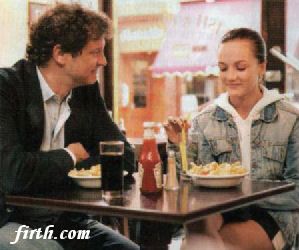 “Mark works in a world of big business,
a world of self-interest, and it bothers him, and for one reason or
another he ends up working with homeless people,” says Colin, who made
his name as the moody Mr Darcy in the 1995 TV version of Pride And Prejudice and whose
recent work has been on the big screen in films such as Bridget Jones’s Diary, Love Actually
and Girl With A Pearl Earring.
“Mark works in a world of big business,
a world of self-interest, and it bothers him, and for one reason or
another he ends up working with homeless people,” says Colin, who made
his name as the moody Mr Darcy in the 1995 TV version of Pride And Prejudice and whose
recent work has been on the big screen in films such as Bridget Jones’s Diary, Love Actually
and Girl With A Pearl Earring.“Perhaps some of what he goes through is a product of a mid-life crisis, problems with his marriage or his wanting to run away from feeling trapped.”
But things spiral out of control when he becomes involved with a teenage runaway, Zoë (Nichola Burley), who begins to rely on him.
“Mark is a sympathetic character at times, but there are other times when his behaviour makes it impossible to feel that about him. In trying to assuage his guilt, he ends of hurting a lot of people,” explains Colin, who lives in London with his Italian TV producer wife Livia and their two sons Luca, five and Mateo, three.
The actor feels that his character is not so far removed from those he helps.
“It’s not just about middle-class versus sleeping rough. Mark is as alienated from his life in his own bedroom as he is from life in some underpass. He and Zoë have something in common in that they’re both fugitives. In Zoë’s case it’s more understandable but with Mark it’s much less defined.”
(Check out the cover boy)
(TV Choice, Dec 16, 2006, by Elaine Penn)
Colin Firth plays a privileged Londoner who decides to help the homeless in a hard-hitting, entirely improvised new drama
When a wealthy City worker starts to feel guilty about his lifestyle and decides to help those who are less fortunate, the decision has devastating consequences for him and those around him in gritty one-off drama Born Equal.
Mark (Colin Firth) lives a privileged life in a beautiful house. His wife is pregnant with their first child. But after seeing so many other people struggling, he volunteers for charity work.
He goes to a B&B which houses homeless people. There he meets pregnant mum Michelle (Anne-Marie Duff), who is hiding from her abusive husband. And then there’s Yemi (David Oyelowo) and Itshe (Nikki Amuka-Bird), who have fled Nigeria with their young daughter, while Robert (Robert Carlyle), has just been let out of prison.
 The strongest connection Mark makes is
with teenage runaway Zoe (Nichola Burley). Her fears of living with her
violent stepfather make Mark realise that he too has reasons for not
wanting to go home.
The strongest connection Mark makes is
with teenage runaway Zoe (Nichola Burley). Her fears of living with her
violent stepfather make Mark realise that he too has reasons for not
wanting to go home.“Mark works in big business, a world of self-interest, and it bothers him,” explains Colin, who shot to fame as Mr Darcy in 1995’s Pride And Prejudice, and lives in London with his wife Livia and sons Luca, five, and Matteo, three.
“When he gets involved in working with homeless people, it gets a bit too much for him—things happen that make it difficult for him to be too idealistic.”
The production was entirely improvised, with no script or rehearsals, an approach Colin say she found extraordinary.
“I’d never done anything like this before. You just jump in cold. You’re flying by the seat of your pants all the time. You don’t know how a scene is going to work out until it ends.
“I was much more interested in what came out of my mouth in front of a camera than if I’d thought it up the night before.”
(Telegraph Magazine, Oct 21, 2006)
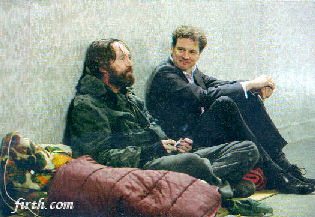 With Born Equal
it started with the premise of a film about homelessness today. I was
struck by the number of people living in temporary accommodation due to
an affordable-housing shortage. At present there are more than 100,000
households stuck in this situation. I did a tour of temporary hostels
around the country, with the specific intention of meeting people who
had known a better
life, but through circumstance had ended up in a hostel. I was
interested in that change of life, how and why people can fall between
the cracks. I met and spoke with many people, at least 50. I would sit
in their rooms and hear their conversations. Even though I had a Walkman I never recorded
the conversations—it seemed insensitive. It was the memories of those
meetings that became
important for me, the feelings I got from those people. What came
across to me strongly was not so much the grim conditions and the
psychological effects of not having your own home—as bad as that is—but
the reasons why people had found themselves in this situation, which as
I saw it could just as easily happen to me, and many others like me. It
doesn’t take much, just a series of unfortunate events—relationship
breakdown, illness, losing a job—to tip one’s life into a descent, and
once you are in that situation it’s really hard to get out of it.
With Born Equal
it started with the premise of a film about homelessness today. I was
struck by the number of people living in temporary accommodation due to
an affordable-housing shortage. At present there are more than 100,000
households stuck in this situation. I did a tour of temporary hostels
around the country, with the specific intention of meeting people who
had known a better
life, but through circumstance had ended up in a hostel. I was
interested in that change of life, how and why people can fall between
the cracks. I met and spoke with many people, at least 50. I would sit
in their rooms and hear their conversations. Even though I had a Walkman I never recorded
the conversations—it seemed insensitive. It was the memories of those
meetings that became
important for me, the feelings I got from those people. What came
across to me strongly was not so much the grim conditions and the
psychological effects of not having your own home—as bad as that is—but
the reasons why people had found themselves in this situation, which as
I saw it could just as easily happen to me, and many others like me. It
doesn’t take much, just a series of unfortunate events—relationship
breakdown, illness, losing a job—to tip one’s life into a descent, and
once you are in that situation it’s really hard to get out of it.The people I met were very ready to talk about their lives—maybe it was a way of unburdening themselves. I always remember the stories people tell me, and how it affected me when I heard them and use that when I am writing the characters and themes in a film.
There is always a point when through someone I meet I am so moved that I know I have to make this film. There was a woman in a B&B in Scarborough who had had a comfortable life. She had a three-year-old and was expecting another shortly. She had escaped from domestic violence, preferring the idea of having nothing rather than enduring a life of violence. She was lost and numb; she had no one, and no one to be at the birth. I didn’t know how much worse things could get in life, the fact that all this pain was tied in with the supposed joy of birth. It really set the tone for the film.
When I visited a hostel in Swiss Cottage, London, just round the corner from multi-million-pound homes, themes of inequality started to emerge. Then I knew that I wanted to make a multi-stranded film that compared lives, while showing other people in crisis. I wanted my film to make us all think about the people who are in those situations. If you understood it could happen to you, you might think a little bit more about the people we see around us every day who are living in desperation, hand to mouth.
The next process is forming the story and characters. This is always a mixture of everything—people and stories I have heard, not just recently, but over the years, and a lot of myself: my fixations, paranoias, personal experiences and philosophies. I decided the story of Born Equal was to be about a set of characters connected by a temporary accommodation hostel and the area where the hostel is situated. All of them are in search of something, a decent life, and all of them are in crisis. Robert Carlyle plays Robert, a man out of prison searching for his mother. Dislocated from society, he is trying to escape his past and make a clean start. The hostel is where he meets Michelle (Anne Marie Duff), who is pregnant and has a six-year-old daughter, Danielle (Gemma Barrett). Michelle has escaped domestic violence and in their desperation their relationship offers them some kind of hope. Yemi (David Oyelowo) and Itshe (Nikki Amuka-Bird) are in the hostel having escaped violence in their native Nigeria. They have no money and no home, and a parent in real danger. Meanwhile, Colin Firth plays a wealthy hedge-fund manager who is going through his own crisis. Combining these stories gives a broader picture of the film’s overall themes: the importance money in society, the huge gaps it creates, plus the importance of other people in our lives to make our own complete. The importance of family.
The third part of my process is casting. I never think it wise to predetermine who will be right for my film. Part of the casting process is seeing who is up for my kind of way of working, above all who I have a connection, a chemistry, with. Again, all of this is very instinctive. Trust between the director and actors is essential. Ultimately, the way I work is quite uncomplicated. It’s engaging everyone in creating this something that illuminates, uncovers, and offers some insight into humanity and life.
It is through the input, feelings and real-life experiences of the actors that the characters and final elements of the stories are really brought to life. With this way of working, it is a very exposing process, and I believe that because they put so much of themselves in to Born Equal, it has made the film special, both in terms of the process, and the end result.
Maybe my approach to filming comes from that sense of being an outsider, because of my background; maybe because my parents both came from poor backgrounds, but improved their lives a little and gave us the opportunity to do something more. I am trying to do that ‘something more’ in my own way, which expresses my need to tell stories that have a meaning, that reflect life, and hopefully make people think about society today. I hope the films that I make might effect some sort of change, even if it is only one person who changes as a result—if I have illuminated an aspect of life, of humanity, to that one person then I have succeeded. Of course I want that to happen to millions.
At the heart of Born Equal is a love story, albeit one that can’t succeed—I find love and film an enticing combination. With my next film, I want to make a serious romantic love story, because in the end love is the beset thing that we humans have got, or will ever have.
(read full article here)
(Guardian, Oct 14, 2006, by Emma Brockes)
The extent to which she is willing to suspend her vanity has always been used as a test of an actor's seriousness. Anne-Marie Duff is well proven. She has played a tortured Irish teenager in shapeless borstal clothes; a skint Mancunian in Day-Glo velour; and now, in her latest role, she appears in frayed and faded costume, hair lank about her ears as she drags a small child and a suitcase across the concourse at King's Cross station. Born Equal is a BBC drama made to mark the 40th anniversary of the Ken Loach classic Cathy Come Home, in which Duff plays a young mother on the run from an abusive partner. It has become something of a specialism, this: her ability to portray doomed, miserable women without stripping them wholly of lightness or the power to attract....
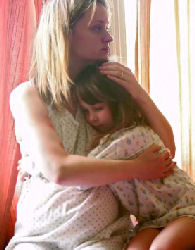 Duff's new role was initially conceived
of as a modern remake of Cathy, the first film seriously to address
homelessness. In the end, Dominic Savage, the film-maker, decided to
write a new story tackling different but equally traumatic social
issues. Duff herself grew up on an estate in Hayes, a suburb of west
London, but it was nothing like the grim estates some of her characters
have come from....
Duff's new role was initially conceived
of as a modern remake of Cathy, the first film seriously to address
homelessness. In the end, Dominic Savage, the film-maker, decided to
write a new story tackling different but equally traumatic social
issues. Duff herself grew up on an estate in Hayes, a suburb of west
London, but it was nothing like the grim estates some of her characters
have come from....After filming ended, Duff was frozen for almost a year. She couldn't imagine finding another role as fulfilling and didn't want to repeat herself, so she and McAvoy went travelling around the world, to America and New Zealand, before coming back to their home in London. She was starting to get anxious that she had become too picky about roles when Dominic Savage invited her for a cup of tea to talk about a new drama he had in mind, set in London. The way Savage worked intrigued her; he had the spine of a script, but the bulk of the action was to be improvised. Her character has a six-year-old daughter and is escaping a violent relationship—more misery—but what won it for Duff was that the characters were fundamentally "good people" and sympathetic. She visited a women's refuge to research the role and felt burdened with a certain responsibility not to make her character too downtrodden. Her co-stars include Robert Carlyle, Colin Firth and Emilia Fox, although the story is very fragmented, and she only really has scenes with the "lovely" Carlyle.
"It was an interesting experience because I was playing a woman who isn't an alpha personality, and it's hard to improvise in that way, because quite often improvisation is all about fireworks and impressing. The pressure is for actors to be very impressive. So when you're playing somebody who isn't going to drive the scene, you... It was a test. A good test, I hope."
It was harrowing material for the child actor involved, but "as she comes from a happy, safe, loving family, we never had to worry that we were damaging her. She just seemed able to click in and out."
(24dash.com, Oct 9, 2006, by Ian Morgan)
Up and coming Brit Actress Nichola Burley (Love & Hate, Shameless) visited Centrepoint and spoke to young homeless people as part of her research for a role in 'London' a forthcoming BBC One film-drama.
The one-off drama, which addresses social inequality in Britain today, features Colin Firth and Robert Carlyle and is written and directed by Bafta award-winning Dominic Savage. It will be shown on BBC One early November, 40 years on from Ken Loach's groundbreaking drama Cathy Come Home which revealed the shocking story of a young homeless couple caught in a poverty trap.
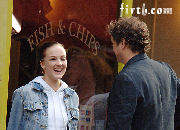 Burley plays a young runaway from Leeds
and is one of several characters whose paths collide at a B&B
temporarily housing the homeless. The actress was keen to meet and
discuss her part with some of the young homeless people Centrepoint
support across London each night, she spent an afternoon chatting to
young people living at Centrepoint Berwick Street, an emergency service
in Soho. "I felt I had to talk to young homeless women to keep my
character true to life," said Nichola Burley.
Burley plays a young runaway from Leeds
and is one of several characters whose paths collide at a B&B
temporarily housing the homeless. The actress was keen to meet and
discuss her part with some of the young homeless people Centrepoint
support across London each night, she spent an afternoon chatting to
young people living at Centrepoint Berwick Street, an emergency service
in Soho. "I felt I had to talk to young homeless women to keep my
character true to life," said Nichola Burley."I was shocked and saddened to hear their stories. I never realised just how bad it gets for some young people, particularly those who are forced into prostitution and drugs. I hope I can do them justice in my role and would like to thank Centrepoint for giving me the opportunity to find out first hand the kind of challenges they face on a daily basis."
Anthony Lawton, Centrepoint chief executive said: "Centrepoint Berwick Street is a real safety net, keeping the UK's most vulnerable young people off the streets, safe and supported. Nicola lifted the spirits of the young people she met and in turn was genuinely moved by their experiences. We are pleased to work with the BBC to ensure the drama is a true representation of homelessness today and hope it will challenge audience stereotypes and preconceptions."
(Daily Mail, June 30, 2006, by Baz Bamigboye)
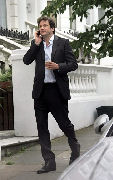 Colin Firth kept
pacing up and down the smart street lined with £3 million
homes.
Porsches turned into the street and people kept peering through the net
curtains. The actor was shooting a film for BBC1 by director
Dominic
Savage. Everyone kept saying how ‘edgy’ it was, but the actor saw it
slightly differently.
Colin Firth kept
pacing up and down the smart street lined with £3 million
homes.
Porsches turned into the street and people kept peering through the net
curtains. The actor was shooting a film for BBC1 by director
Dominic
Savage. Everyone kept saying how ‘edgy’ it was, but the actor saw it
slightly differently.‘When you say edgy, you think of something experimental and way out there. This isn’t that. This is just a reflection of life’.
It is a bit edgy, though, in the way Savage films in the raw. He often lets members of the public walk into the shot. The other night, Colin was filming with a younger actress in Marylebone and passers-by thought it was his girlfriend. ‘There were lot of comments, but we kept the film rolling,’ Colin said.
In the movie, which has the working title London, Savage has assembled a number of top young actors including Anne-Marie Duff, David Oyelowo, Robert Carlyle, Emily Woof, Emilia Fox and Nikki Amuka-Bird. What links them all is a hostel for the homeless.
Savage stressed that it’s not a remake of Cathy Come Home. Rather, he and producers Ruth Caleb and Lucy Hillman have made a film that explores many levels of the social strata.
‘From the perspective of my character, it’s about the emotional cost of doing good,’ Colin said.
 (BBC News, May 31, 2006)
(BBC News, May 31, 2006)Actors Colin Firth and Robert Carlyle are to star in a BBC drama marking the 40th anniversary of Ken Loach's film Cathy Come Home. The drama will tell the stories of several characters who find themselves living in temporary housing. It echoes Loach's powerful 1966 film, which showed how an average family became homeless.
The new drama will also star Nighty Night star Julia Davis and Anne-Marie Duff from Shameless.
Firth will take the lead role, playing a wealthy city worker trying to help people less fortunate than himself and getting drawn into their lives.
Provisionally called London, the drama has been written and directed by Dominic Savage, who made the 2002 youth offenders' drama Out of Control. "This is a film about social inequalities, people in desperate circumstances and their intertwining different lives," he said. "It's ultimately about people's relationships and the difficulties, dilemmas and moral issues they face."
The film will not be a remake or update of Cathy Come Home, said a BBC spokesperson. Loach's drama sparked a national debate and led to the establishment of the homeless charity Shelter. A poll conducted by the British Film Institute in 2000 found Cathy Come Home was the second favourite programme of all time for UK TV industry figures.
(The Stage, May 31, 2006)
It stars Firth as a wealthy City worker whose conscience about his luxurious lifestyle prompt him to aid the less fortunate, while Duff plays a pregnant mother escaping an abusive husband, played by Oyelow. Carlyle plays a newly-released convict.
(May 31, 2006)
A stellar line-up featuring Colin Firth, Anne-Marie Duff, David Oyelowo and Robert Carlyle begins shooting this week on London (working title) a major BBC ONE film drama, written and directed by Bafta award-winning Dominic Savage.
Savage's gripping dramas, such as Love and Hate, Out of Control and Nice Girl, are dedicated to tackling contemporary social issues. In this film he addresses social inequality in Britain today through the lives of several characters whose paths collide at a B&B temporarily housing the homeless and dispossessed.
Mark (Colin Firth) is a wealthy city worker whose conscience and guilt about his luxurious lifestyle prompt him to try to help those less fortunate, but it results in turmoil for both himself and others. Staying at the B&B are Michelle (Anne-Marie Duff), a pregnant mother with a young child who escapes an abusive husband; Nigerian Yemi (David Oyelowo), and his family; and Robert (Robert Carlyle), newly released from prison.
Dominic Savage explains further: "This is a film about social inequalities, people in desperate circumstances and their intertwining different lives.
"It's ultimately about people's relationships and the difficulties, dilemmas and moral issues they face."
The cast also includes Emilia Fox, Julia Davis, Megan Dodds, Nikki Amuka-Bird, Nichola Burley, Emily Woof and Pearce Quigley.
(Netribution, May 5, 2006, by Stephen Applebaum)
 Is this the film to
commemorate the 40th anniversary of Cathy Come Home?
Is this the film to
commemorate the 40th anniversary of Cathy Come Home?“Indeed it is. That’s how it started. It started as a film about homelessness today, on the 40th anniversary of Cathy Come Home, but it’s changed into more of a film about social inequality and more the fact that there are incredibly wealthy people living side-by-side with incredibly poor people, and of course it then also reflects the state of homelessness today in terms of the fact that a lot of people are living in temporary accommodation for two, three, four, five years without a proper home. It’s all set in London and it’s all about the kind of huge, huge gap between the rich and the poor, and those different lifestyles that clash.”
Would you say that’s the biggest difference since Loach made his film, the inequality?
“Well, I think the system is trying to help people much more. That was shocking, I suppose, because it was about how the system failed them and how they slipped between all kinds of nets. That still exists but I think there’s more care in place. But it doesn’t take away from the fact that there isn’t enough places to house people. There’s not enough homes for people. And it isn’t right that people should be on waiting lists for years and years, and people aren’t effectively housed. Living in hostels and stuff is not home. So that’s the difference, I think. But also social inequality has never been as extreme as it is at the moment; the huge wealth of some people, and the fact that there are still people living in poverty.”
Colin Firth and Ann-Marie Duff are in it, I believe.
“Yes, it’s a move on for me in many ways in that I’m not so much working with first timers. It’s much more experienced actors now. There will be some discoveries, but mostly established actors. So it’s exciting. And they’ve bought up for the process that I make films with. The whole improvised approach, they’re really interested in that. So it’s going to be made in the same way, but they’re going to have un-learn all their acting.”
Yes, you told me last year that your next big challenge was to make a film with established actors and bring them into your way of working. Is that going to be difficult for someone who is as well known as, say, Colin Firth?
“Definitely. It’s going to be harder in many ways but we’re going to work on the premise that they’re going to work on their personal experiences and life experience—and they’ll have to, because it’s improvised. That’s the difference, I think. The people I’ve cast, it’s not just because they’re those names. It’s also because they’re prepared to do that. Many stars aren’t, I don’t think, but many of them have again got a connection with the role they’re playing—an emotional and experience connection—so that’s really interesting again. Hopefully we’ll be able to draw on those life experiences.”
Does the new film have a title?
”The working title is London—it’s all set in London—but we’ll probably change it.”
Do you think a film now could have the same impact as Cathy Come Home?
“I don’t. It won’t have it in the same way. I think what I’m looking for is an impact that just engages people in issues of society. Hopefully I’m going to try and make a film that talks about what society is today, and all the kind of dilemmas that society’s facing, and try and encapsulate that in a film. So I’m hoping to be ambitious. But it is about difference and how we’re all same, really. In the film all these different kinds of levels of people collide, and it’s about what happens when they do. So hopefully it will be a provocative film, but I can’t say it will provoke the set up of a new charity [laughs] or anything like that. I can’t promise that but there’s hope. There’s hope [laughs].”
(Daily Mail, Apr 7, 2006, by Baz Bamigboye)
A radical movie that explores aspects of poverty, race, inequality and class—some are calling it a British version of Oscar best winner Crash—is about to be shot on the streets of London by the BBC.
Anne-Marie Duff, in contention for a best actress honour for Shameless in the forthcoming Pioneer BAFTA awards, former Spooks actor David Oyelowo, and Colin Firth are among those in delicate negotiations to appear in writer-director Dominic Savage's film.
Savage, an insightful filmmaker who likes to build upon the characters he creates through extensive rehearsals and improvisational sessions, has set his film, which has the working title of The London Project, in a North London hostel for the homeless. Three of the inhabitants' stories will be inter-linked with that of a middle-class 'do-gooder' who wants to help.
Ms Duff hopes to begin filming in late May or early June, and she would play an 'upper'working-class wife who escapes her abusive husband and goes to the hostel. Mr Oyelowo would take the part of a Nigerian political refugee and Mr Firth—if he agrees to do the film—the role of a disillusioned businessman.
Paul Haggis's movie Crash, which starred Thandie Newton and Matt Dillon, was an early inspiration for The London Project. 'That film had a big impact on Dominic,' one of the actors said.
The film has been developed through the BBC's drama and documentary departments. Ruth Caleb, one of the corporation's most distinguished producers, is pushing to get it made. Filming, once contracts are sorted out, should start in late May or early June.
Please do
not upload
any images to
your own website, club, group or community's photo album. Thank you. |
Click on boots to contact me  |

